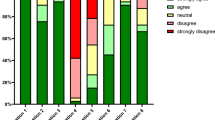Abstract
Purpose
To assess the effects of the American Academy of Ophthalmology’s 2015 patient education video on patient information retention and anxiety preoperatively, on the day of surgery and postoperatively.
Methods
This is a prospective, surgeon-blinded randomized controlled trial at the University of Chicago Medical Center. Ninety-one patients with a diagnosis of first-eye cataract were randomized into either a video or control group. Subjects in both groups received face-to-face discussion with the surgeon and an informational brochure at the preoperative evaluation. Participants in the video group then viewed a four-minute educational video at the preoperative evaluation and on the day of surgery. Both groups completed an information retention quiz and a state anxiety assessment at the preoperative visit, on the day of surgery, and on the postoperative week one visit. Subject understanding of cataract surgery was measured using a twelve-question multiple choice quiz. State anxiety was measured by State Trait Anxiety Inventory-Y1 survey score.
Results
Participants in the video group did not score significantly higher on the information retention quiz compared with the control group at the preoperative evaluation (8.7 ± 2.4 vs 7.7 ± 2.5, P = 0.07), but did so on the day of surgery (11.2 ± 0.8 vs 8.4 ± 1.7, P < 0.001) and postoperative week 1 visit (10.8 ± 1.5 vs 9.0 ± 2.0, P < 0.001). Subjects in the video group were significantly less anxious on the day of surgery (26.4 ± 5.1 vs 41.1 ± 10.3, P < 0.001).
Conclusions
Video supplementation to the traditional informed consent process demonstrated an improvement in patient understanding of cataract surgery at multiple timepoints and decreased anxiety on the day of surgery.



Similar content being viewed by others
References
Kiss CG, Richter-Mueksch S, Stifter E et al (2004) Informed consent and decision making by cataract patients. Arch Ophthalmol 122:94–98. https://doi.org/10.1001/archopht.122.1.94
Bhan A, Dave D, Vernon SA et al (2005) Risk management strategies following analysis of cataract negligence claims. Eye (Lond) 19:264–268. https://doi.org/10.1038/sj.eye.6701493
Lavelle-Jones C, Byrne DJ, Rice P, Cuschieri A (1993) Factors affecting quality of informed consent. BMJ 306:885–890
Schenker Y, Meisel A (2011) Informed consent in clinical care: practical considerations in the effort to achieve ethical goals. JAMA 305:1130–1131. https://doi.org/10.1001/jama.2011.333
Tipotsch-Maca SM, Varsits RM, Ginzel C, Vecsei-Marlovits PV (2016) Effect of a multimedia-assisted informed consent procedure on the information gain, satisfaction, and anxiety of cataract surgery patients. J Cataract Refract Surg 42:110–116. https://doi.org/10.1016/j.jcrs.2015.08.019
Kraushar MF (1987) Medical malpractice litigation in the Management of Vitreoretinal Diseases. Arch Ophthalmol 105:187–190. https://doi.org/10.1001/archopht.1987.01060020041024
Morgan LW, Schwab IR (1986) Informed consent in senile cataract extraction. Arch Ophthalmol 104:42–45
Wollinger C, Hirnschall N, Findl O (2012) Computer-based tutorial to enhance the quality and efficiency of the informed-consent process for cataract surgery. J Cataract Refract Surg 38:655–659. https://doi.org/10.1016/j.jcrs.2011.10.038
Shukla AN, Daly MK, Legutko P (2012) Informed consent for cataract surgery: patient understanding of verbal, written, and videotaped information. J Cataract Refract Surg 38:80–84. https://doi.org/10.1016/j.jcrs.2011.07.030
Goldberger JJ, Kruse J, Kadish AH et al (2011) Effect of informed consent format on patient anxiety, knowledge, and satisfaction. Am Heart J 162:780–785.e1. https://doi.org/10.1016/j.ahj.2011.07.006
Zhang Y, Ruan X, Tang H et al (2017) Video-assisted informed consent for cataract surgery: a randomized controlled trial. J Ophthalmol 2017:9593631. https://doi.org/10.1155/2017/9593631
Deyo RA, Cherkin DC, Weinstein J et al (2000) Involving patients in clinical decisions: impact of an interactive video program on use of back surgery. Med Care 38:959–969
Kincaid JP et al (1975) Derivation of new readability formulas (automated readability index, fog count and Flesch Reading ease formula) for navy enlisted personnel. National Technical Information Service, Springfield, Virginia 22151 (AD-A006 655/5GA, MF $2
Rawson KA, Gunstad J, Hughes J et al (2010) The METER: a brief, self-administered measure of health literacy. J Gen Intern Med 25:67–71. https://doi.org/10.1007/s11606-009-1158-7
Spielberger CD, Gorsuch R, Lushene RE, Jacobs GA (1983) Manual for the state-trait anxiety inventory. Consulting Psychologists Press, Palo Alto
Spielberger CD, Sydeman SJ (1994) State-trait anxiety inventory and state-trait anger expression inventory. In: The use of psychological testing for treatment planning and outcome assessment. Lawrence Erlbaum Associates, Inc, Hillsdale, pp 292–321
Eggers C, Obliers R, Koerfer A et al (2007) A multimedia tool for the informed consent of patients prior to gastric banding. Obesity 15:2866–2873. https://doi.org/10.1038/oby.2007.340
Gautschi OP, Stienen MN, Hermann C et al (2010) Web-based audiovisual patient information system—a study of preoperative patient information in a neurosurgical department. Acta Neurochir 152:1337–1341. https://doi.org/10.1007/s00701-010-0663-0
Ader DN, Seibring AR, Bhaskar P, Melamed BG (1992) Information seeking and interactive videodisc preparation for third molar extraction. J Oral Maxillofac Surg 50:27–31. https://doi.org/10.1016/0278-2391(92)90188-6
Dhingra N, Clews S, Neugebauer MA, Hubbard AD (2004) What patients recall of the preoperative discussion before cataract surgery: results of a questionnaire survey. Eye 18:790–791. https://doi.org/10.1038/sj.eye.6701420
Funding
This study was funded by The University of Chicago Pritzker School of Medicine, Chicago, IL, USA. The sponsor or funding organization had no role in the design or conduct of this research.
Author information
Authors and Affiliations
Corresponding author
Ethics declarations
Conflict of interest
The authors declare that they have no conflict of interest.
Ethical approval
All procedures performed in studies involving human participants were in accordance with the ethical standards of the institutional and/or national research committee and with the 1964 Helsinki declaration and its later amendments or comparable ethical standards.
Informed consent
Informed consent was obtained from all individual participants included in the study.
Additional information
Publisher’s note
Springer Nature remains neutral with regard to jurisdictional claims in published maps and institutional affiliations.
Rights and permissions
About this article
Cite this article
Zhang, M.H., Haq, Z.U., Braithwaite, E.M. et al. A randomized, controlled trial of video supplementation on the cataract surgery informed consent process. Graefes Arch Clin Exp Ophthalmol 257, 1719–1728 (2019). https://doi.org/10.1007/s00417-019-04372-5
Received:
Revised:
Accepted:
Published:
Issue Date:
DOI: https://doi.org/10.1007/s00417-019-04372-5




